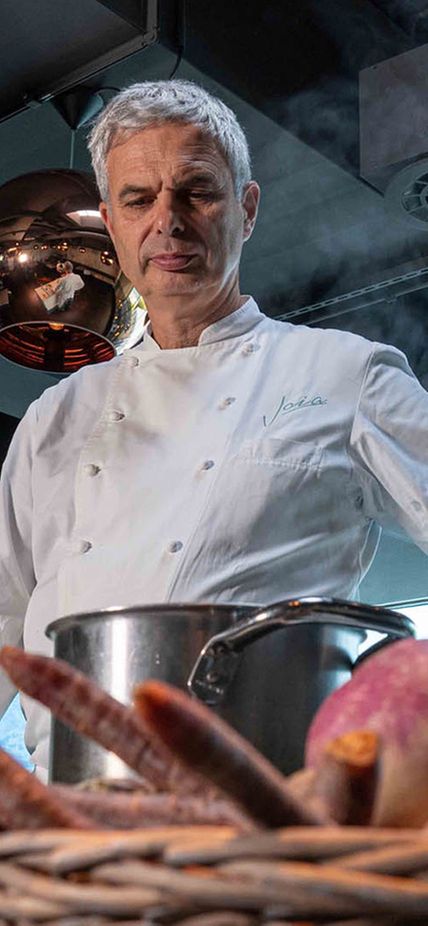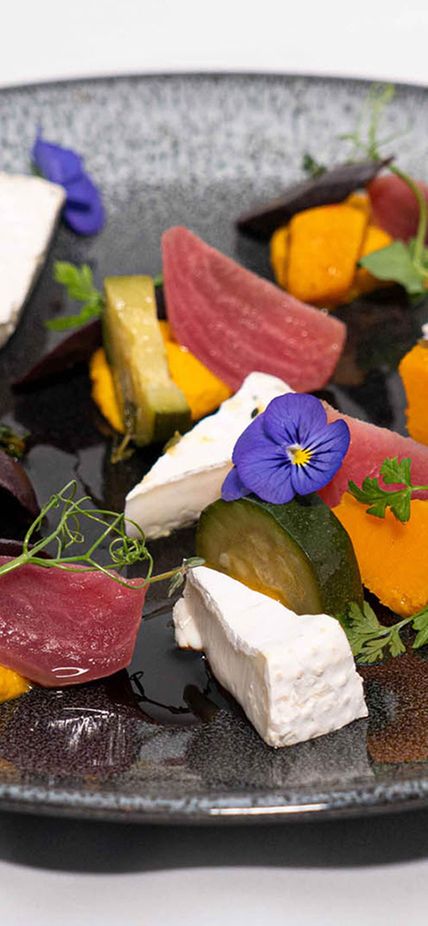Ascona-Locarno’s top-quality products attract top chefs. It’s no coincidence that there are four Michelin stars in the Lake Maggiore region and 458 Gault & Millau points: an average of 14 points across 33 restaurants, led by Ristorante Ecco at the Hotel Giardino (2 stars), Ristorante La Brezza at the Hotel Eden Roc (1 star) and Locanda Barbarossa at the Hotel Castello del Sole (1 star). The region has also given us great chefs who take the flavours of our region with them to other countries. We take a sneak peek into the kitchen of a Michelin-starred chef who hails from Locarno.
“People of substance are important when you're young. I decided to become a chef thanks to my close relationship with the charismatic great chef from Ticino Angelo Conti Rossini, who was a good family friend. I was 15. Thanks also to Angelo, I was lucky enough to work in some of the most important restaurants in Europe to learn the trade, under the guidance of great masters such as Gualtiero Marchesi and Frédy Girardet”. In the 1980s, Pietro decided to explore his growing interest in vegetarian cuisine, a choice that, thanks to his sensitivity and respect for all living creatures and the environment, took him to the Orient, where he lived for several years between China, Japan and India, discovering the values of healthy vegetarian cuisine.

“Vegetarian cuisine is increasingly important in society, because more and more people are starting to follow it. While between the post-war period and the early 1990s, people ate meat several times a day, nowadays the trend is to consume less meat and to eat more plant-based foods as a consequence”. A plant-based world that, the chef tells us, is not always easy to interpret and shouldn’t try to imitate meat, but instead to bring out the value of the ingredients used and the strengths they offer. Ascona-Locarno products know how to stand out in this respect: grown under the Ticino sunshine – which Pietro Leemann compares to Sicily – they have a unique taste that’s easy to celebrate.
When talking about a vegetarian and sustainable philosophy, the use of local products also naturally comes into play. “People talk a lot today about ‘zero-kilometre’ food. It’s almost a fashionable term. If you think about it, it’s difficult to really eat zero-kilometre food, but there is a lot that can be done. Every product you buy is produced on average 4,000 km from where it’s eaten. This is crazy! Long journeys raise prices and are not ecologically sustainable. Zero-kilometre food gives us better quality and we need to defend it vigorously, but to do so we need partnerships between those who cook and those who produce. In this sense, restaurants have a responsibility to act as intermediaries in promoting local products”.
A mission that Chef Davide Asietti from Blu Restaurant and Lounge in Locarno tries to carry out every day, particularly thanks to his partnership with Pietro Leemann, which came about because he wanted to improve the restaurant’s vegetarian and vegan offering and make it more colourful. “This collaboration obviously uses a great many plant-based products, so the involvement of local producers has a significant impact on the choice of recipes. We’re very lucky because our region is so sunny and can offer us a wide range of different products. Of course, unfortunately we can’t use them all in our kitchen, and we don’t always receive them consistently, so we have to take seasonality into account when planning the menu”. In a large restaurant like Blu Restaurant and Lounge, where they use around 5 tons of potatoes and 4.5 tons of tomatoes per year, sourcing from a single local producer is not always easy. “Where possible we work with local producers to make sure our products are always fresh”.


